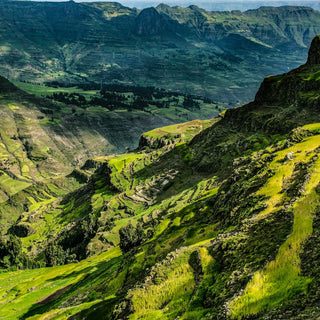Known for its incredible geographical location, Ethiopia boasts landscapes of beauty. From mountain ranges to plateaus and high valleys, the region is incredibly breathtaking.
Ethiopia is treasured as being the birthplace of coffee and beans found in this region are some of the most sought after. With exceptional climate and natural surroundings, sweet Arabica beans naturally grow in the country's forests. Today, it is one of the main coffee sourcing regions of the world, ranking as the fifth largest coffee producer on earth.
From the Archives
Our founder, Kirk's experience in Ethiopia as he searched for the most incredible coffees you know and love today.




Ethiopian Coffee History
It is said that coffee originated in Ethiopia, and that its rich history dates back centuries, to the ancient coffee forests.
A famous narrative tells the story of a young goat herder named Kaldi, who noticed his goats were overly energetic after consuming bright red berries from a certain tree.
Curious and intrigued, Kaldi sampled the red berries himself and felt an immediate boost. It is believed that this is when coffee beans were first discovered.
However, it is also said that native mountain tribes discovered the stimulating effects of the coffee bean centuries ago when only the berries were consumed. Ethiopian coffee beans were later spread by Sufi Islam into the Middle East, popularizing the caffeinated drink.
Rituals & Ceremonies
Coffee in this part of the world is dotted with sacred coffee ceremonies performed multiple times a day. In the ceremonies, the woman of the household will light incense and prepare, roast, grind, and boil the coffee in an elaborate show for her guests. After the initial serving, two additional servings are taken, each weaker than the next. It is believed that coffee’s spiritual properties cause a spiritual transformation during this process.

Ethiopian Coffee Culture
"Buna dabo nawa," a popular Ethiopian saying that means "coffee is our bread," encompasses the true role coffee plays within the culture. Not only is coffee widely enjoyed, but it is more than a lifestyle, it is their form of expression.
In Ethiopia, coffee is typically served unfiltered, without milk or cream. In some regions, sweeteners, salt, cardamom, and even coffee cherries are added.

Culinary Uses of Ethiopian Coffee
Although widely consumed as a beverage, Ethiopian coffee has found its way into the world of culinary arts.
Due to its unique flavor profile, and rich bold taste, top chefs are using it in various dishes and desserts.
For example, in savory dishes, chefs rub it onto meats, giving them a deep and flavorful kick. When combined with spices, this enhances the dish's savory taste, making every bite a delicious and complex delight.
In desserts, from traditional tiramisu to trendy espresso-flavored macarons, the distinct flavors of this coffee elevate ordinary delights into gourmet creations, giving depth and gusto to chocolate creations like truffles, cakes, and mousses, satisfying even the most sophisticated palates.
And it's not just limited to food, even mixologists are leveraging Ethiopian coffee to innovate cocktail recipes.
The strong yet smooth taste of Ethiopian coffee pairs well with alcoholic mixes, adding a unique aroma and twist to well-known drinks.
The rich, complex flavor of Ethiopian coffee is clearly making a big impact in the food world, showing how versatile this ancient bean really is. It blends perfectly well with the bold flavors in fancy desserts and also brings a welcome spicy kick to meat dishes.
Ethiopian Coffee Tourism
Recognizing the global appeal of its coffee, Ethiopia has also started promoting coffee tourism. Visitors can tour coffee farms, and even take part in coffee ceremonies.
This, in essence, has stimulated the local economy, creating jobs and boosting other sectors such as hospitality. It has also increased international awareness, and as a result, the country's coffee exports have increased significantly, strengthening its economy.
Ethiopian Coffee Varieties
Each region in Ethiopia produces coffee with distinct characteristics. Ethiopian coffees are known for their wine-like acidity and bright fruity notes. Some are even characterized by their floral aromas and deep berry flavors.
Whether you're sipping a cup from the Sidamo region, with its citrus and spice notes, or enjoying the wine-like tastes of Harrar coffee, Ethiopian beans promise a unique experience for every palate.
Coffee Cultivation in Ethiopia
The cultivation of coffee in Ethiopia is as rich and deep as its history. Its altitude and warm weather create the perfect conditions for coffee plants to flourish.
Coffee cultivation in Ethiopia only began in the 1500s. Prior to that, coffee beans were simply harvested from coffee plants growing naturally. However, by the 16th century, people came up with refined cultivation methods, turning coffee into a commercial crop.
Coffee cultivation, primarily Arabica beans, is mostly done in the lush highland terrains, with small farms producing the majority of the coffee.
Unlike many other countries, Ethiopia has numerous indigenous coffee varieties. This diversity gives Ethiopian coffees a wide range of flavors, making it a fascinating study for coffee enthusiasts.
Some regions in Ethiopia, like Sidamo, Harrar, and Yirgacheffe, have gained international fame for their distinct coffee flavors and aromas.
From Plantation to Production
The coffee production process in Ethiopia is mostly traditional. The cherries are often handpicked, ensuring that only the ripest are chosen.
After they have been picked, they can be processed using the wet or dry method. The dry method involves laying the cherries out in the sun to dry. The wet method involves removing the pulp first before drying.
These methods, combined with the region where the coffee is grown, significantly influence the taste of Ethiopian coffee.
Ethiopian Coffee and Sustainability
Ethiopia's coffee cultivation practices also align with sustainability goals. Much of Ethiopian coffee is grown by smallholder farmers who practice 'garden coffee farming.'
This traditional method involves growing coffee organically alongside other crops such as maize, beans, and bananas. Doing this prevents soil erosion and creates a more ecologically balanced environment.
Besides that, international organizations like the United Nations Industrial Development Organization (UNIDO) have helped farmers improve coffee production through sustainable practices.
Ethiopian Coffee's Global Influence
The spread of coffee from Ethiopia is a tale of trade and cultural exchange. It is believed that from Ethiopia, coffee spread to the Middle East through traders and then to Europe and other parts of the world.
The rich taste and unique properties of Ethiopian coffee beans made them a favorite everywhere they went.
The global demand for Ethiopian coffee has only grown over the years. This increasing popularity is due to the unique flavor and quality of the coffee beans, which really comes down to the region's climate, soil, and unique growing conditions.
Final Thoughts
Ethiopia, with its fertile lands and deep-rooted history, stands tall in the world of coffee.
Its favorable climate, traditional cultivation techniques, and rich cultural significance have made Ethiopian coffee beans an unforgettable staple in the coffee industry.
Today, pop into any specialty coffee shop and chances are you'll find Ethiopian coffee on the menu. And this is mainly due to its beloved robust flavor and taste.
So, if you fancy a unique coffee experience that will leave you wanting more, try Ethiopian coffee.
Experience the taste of Ethiopia in some of our roasts. Try it in our newest limited edition coffee, Ethiopia Kochere, Dark Roast and Moka Java, both are also available in our Dark Roast Variety Pack. If you are an espresso drinker, experience Ethiopia in our Luminary.
Love coffee from Ethiopia? We do, too! Tell us why it's your favorite! @AngelinosCoffee or Facebook.
Sources
Wikipedia. (n.d.). History of coffee. Retrieved from https://en.wikipedia.org/wiki/History_of_coffee



